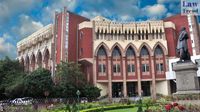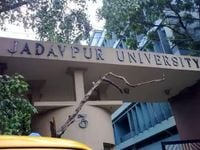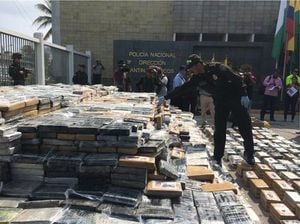The Calcutta High Court has issued a directive to Jadavpur University, instructing the institution not to invite any political functionaries to its programs. This decision comes in the wake of incidents involving the alleged damage to West Bengal Education Minister Bratya Basu’s vehicle during his recent campus visit. The directive was issued by a division bench led by Chief Justice T S Sivagnanam, which also includes Justice Chaitali Chatterjee (Das). The court emphasized that university functions should be restricted to academic participation, highlighting the need for an environment conducive to educational pursuits rather than political involvement.
This ruling was part of the court’s response to a Public Interest Litigation (PIL) that raised concerns about ongoing lawlessness and indiscipline within the university. The petitioner claimed that these issues stemmed from politically affiliated student factions creating unrest. Notable disturbances were reported on March 1, coinciding with Minister Basu’s visit, which led to protests and a student being injured allegedly by the minister’s car.
Amidst these reports, the court has also been urged to enhance security measures on campus. The petitioner has requested the deployment of armed state government police or central forces, overseen by Kolkata Police, and the establishment of a permanent police outpost within the university grounds. In addition to security enhancements, the PIL calls for the formation of a special investigation team to examine all criminal activities associated with the university and to secure the safety of staff and students alike.
Responding to the court’s concerns, the university’s counsel reported that a virtual meeting led by the vice-chancellor on March 15 had resulted in decisions aimed at improving operational smoothness. The court has subsequently ordered the university to submit an affidavit detailing the implementation of these decisions within three weeks, when the matter will be revisited.
The bench further noted the inadequacy of private security agencies currently managing campus safety, questioning their effectiveness given the history of numerous FIRs linked to university incidents since 2014. In fact, the court was informed that at least 23 FIRs have been lodged with the Jadavpur police station since that year, highlighting ongoing concerns about safety and security.
On March 27, 2025, the Calcutta High Court reiterated its stance by barring any political figures from events or seminars at Jadavpur University. The division bench of Chief Justice T.S. Sivagnanam and Justice Chaitali Chattopadhyay directed the university authorities to submit an affidavit on the existing state of security arrangements within the campus within the next three weeks. This ruling came amidst ongoing tensions and disturbances within the university, which have prompted public interest litigation regarding the adequacy of security measures.
The court advised that only academic-related seminars or events should be conducted to prevent the invitation of political personalities, underscoring the need to maintain a focused educational environment. This directive was issued following a tumultuous incident earlier in March when Education Minister Bratya Basu's visit to the campus resulted in significant unrest. During this visit, students were demanding immediate elections for the university’s student council.
During the protests, allegations surfaced that Minister Basu’s vehicle deliberately hit two students, resulting in severe injuries that required hospitalization. In the chaos, the Minister himself sustained minor injuries and was subsequently taken to the state-run S.S.K.M. Medical College and Hospital, where he was treated and later discharged.
The court's decision reflects a growing concern regarding the university's ability to manage safety and security on campus, particularly in light of the ongoing unrest linked to politically motivated student groups. The judges expressed skepticism about the university's reliance on private security agencies, questioning their capability to ensure the safety of students, faculty, and staff.
Furthermore, the court's directive emphasizes the need for the university to take proactive measures in addressing security concerns. The judges pointed out that it is unclear why the university had not sought assistance from state authorities given the history of disturbances, urging the institution to clarify its position on this matter in future hearings.
As the situation unfolds, the university faces mounting pressure to enhance its security protocols and create a more stable environment for academic activities. The court's upcoming review of the university's affidavit will be crucial in determining the next steps in addressing these ongoing issues.
The implications of the court's ruling extend beyond immediate security concerns, raising questions about the role of politics within educational institutions and the extent to which political influences should be allowed to permeate academic settings. As Jadavpur University navigates this complex landscape, the focus remains on fostering a safe and conducive environment for learning, free from the disruptions of political machinations.






